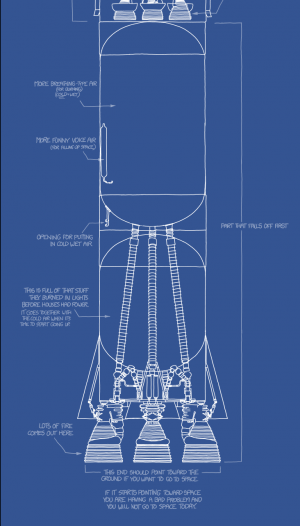Difference between revisions of "106-2018192 Practice for Midterm 1"
(Created page with "==Question 1== small|right|The disc with a hole Your team is working on Saturn V's F1 engines. You are tasked with finding a way to measure the a...") |
|||
| Line 1: | Line 1: | ||
==Question 1== | ==Question 1== | ||
| − | [[File:106practice1Q1F1.png| | + | [[File:106practice1Q1F1.png|thumb|right|The disc with a hole]] |
Your team is working on Saturn V's F1 engines. You are tasked with finding a way to measure the amount of liquid Nitrogen left in the tank which is responsible for filling the space the oxidizer is spent in a precise and quick manner without igniting a spark in a very very volatile situation. A capacitive level sensor is the way to go. The tank can be modeled as a vertically aligned cylindrical capacitor with outer and inner conductor radii <math>R_a</math> and <math>R_b</math> , whose length <math>l</math> spans the height of the tank. When a nonconducting liquid fills the tank to a height <math>h(\leq l)</math> from the tank’s bottom, the dielectric in the lower and upper region between the cylindrical conductors is the liquid (<math>K_{\textrm{liq}}</math>) and its vapor (<math>K_V}</math>), respectively | Your team is working on Saturn V's F1 engines. You are tasked with finding a way to measure the amount of liquid Nitrogen left in the tank which is responsible for filling the space the oxidizer is spent in a precise and quick manner without igniting a spark in a very very volatile situation. A capacitive level sensor is the way to go. The tank can be modeled as a vertically aligned cylindrical capacitor with outer and inner conductor radii <math>R_a</math> and <math>R_b</math> , whose length <math>l</math> spans the height of the tank. When a nonconducting liquid fills the tank to a height <math>h(\leq l)</math> from the tank’s bottom, the dielectric in the lower and upper region between the cylindrical conductors is the liquid (<math>K_{\textrm{liq}}</math>) and its vapor (<math>K_V}</math>), respectively | ||
Revision as of 22:38, 17 March 2019
Question 1
Your team is working on Saturn V's F1 engines. You are tasked with finding a way to measure the amount of liquid Nitrogen left in the tank which is responsible for filling the space the oxidizer is spent in a precise and quick manner without igniting a spark in a very very volatile situation. A capacitive level sensor is the way to go. The tank can be modeled as a vertically aligned cylindrical capacitor with outer and inner conductor radii and , whose length spans the height of the tank. When a nonconducting liquid fills the tank to a height from the tank’s bottom, the dielectric in the lower and upper region between the cylindrical conductors is the liquid () and its vapor (Failed to parse (syntax error): {\displaystyle K_V}} ), respectively
(a) Determine a formula for the fraction F of the tank filled by liquid in terms of the level-sensor capacitance C. (b) By connecting a capacitance-measuring instrument to the level sensor, F can be monitored. Assume the sensor dimensions are l = 2.0 m, R a = 5.0 mm, and R b = 4.5 mm. For liquid nitrogen AK liq = 1.4, K V = 1.0B, what values of C (in pF) will correspond to the tank being completely full and completely empty?





